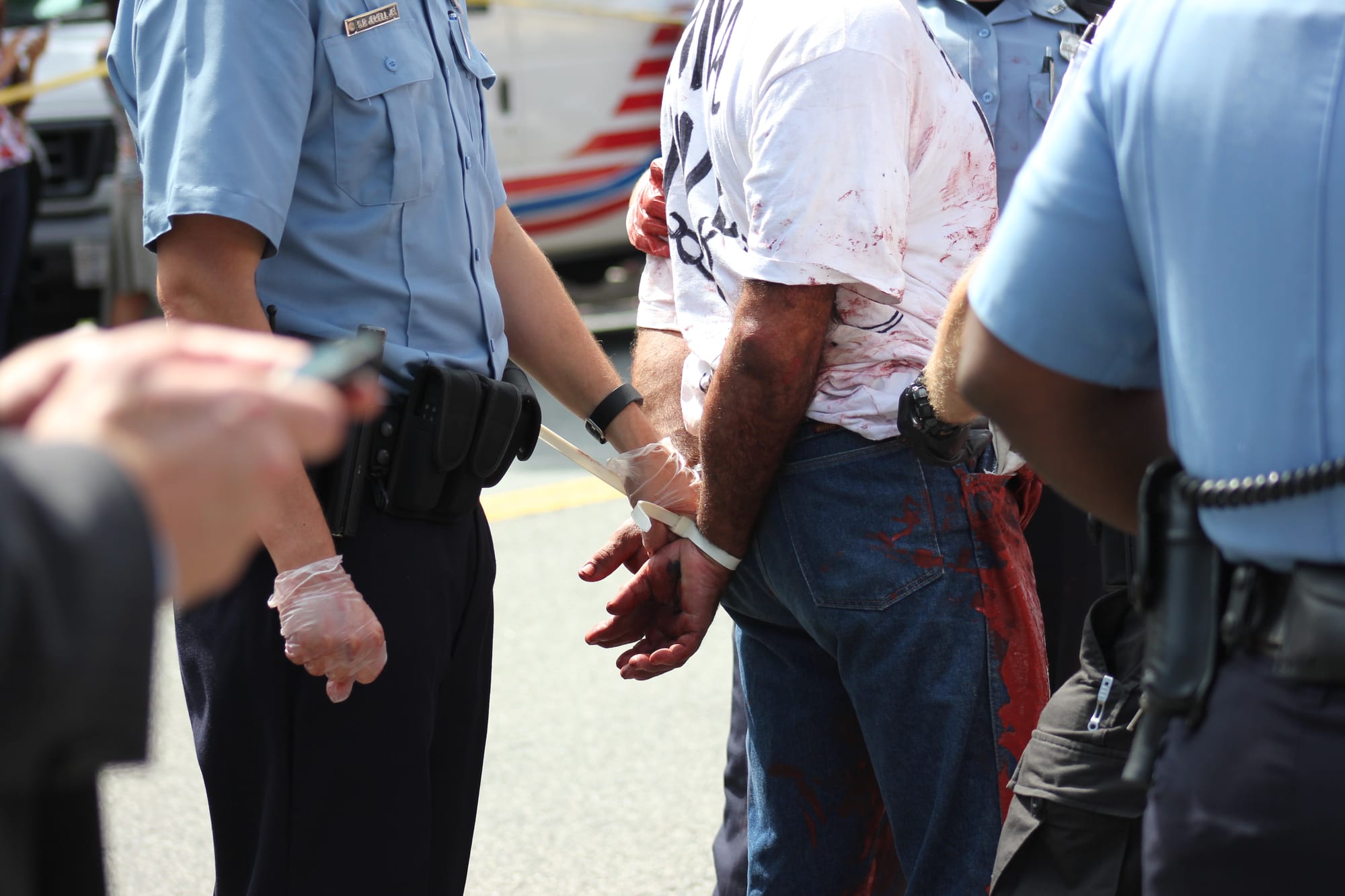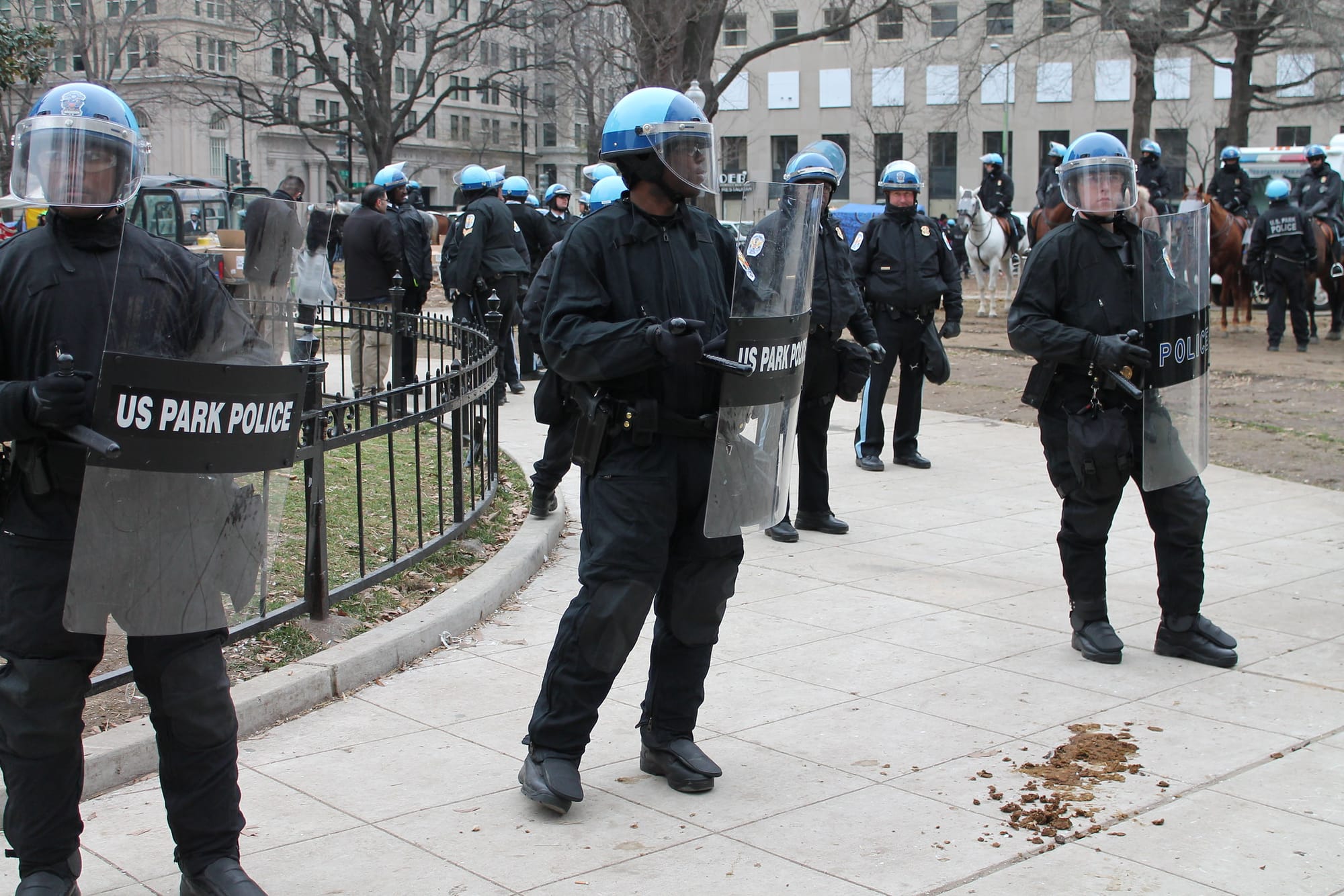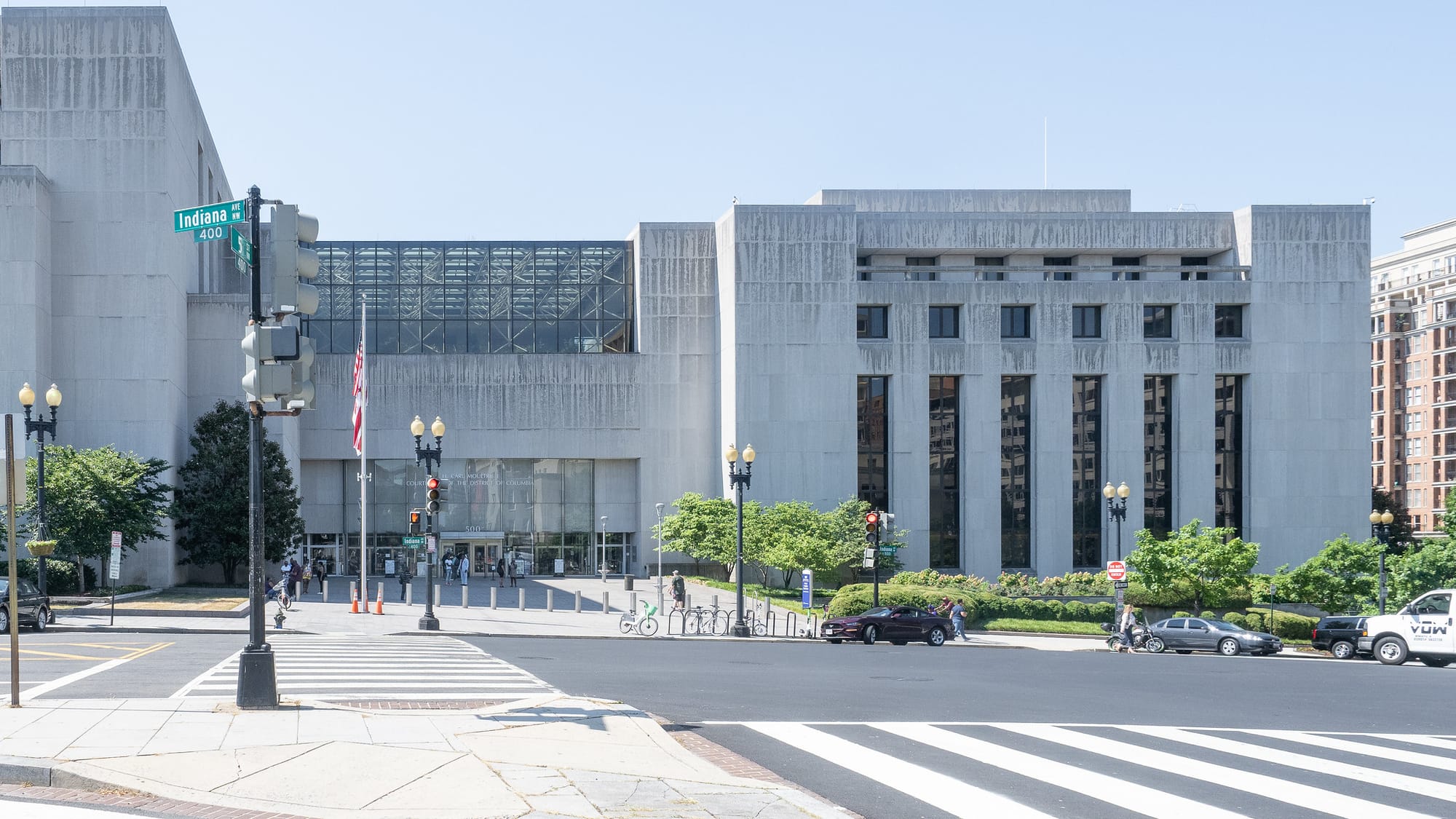Wilson Building Bulletin: A cold dose of reality on D.C.’s budget
And Trayon White gets a new trial date.
Understanding your rights is crucial to protecting yourself and your neighbors.

If you live in D.C., you'll likely come into contact with law enforcement at some point. From the FBI and CIA, all the way to the U.S. Mint police, there are literally dozens of law enforcement agencies policing the District. The city's municipal police force, the Metropolitan Police Department, stopped someone every 10 minutes in 2022 and 2023, according to an ACLU report – 70 percent of them were Black.
MPD is the police force you’re most likely to encounter when you’re out and about in D.C., but there’s also the Metro Transit Police Department, which oversees the rail and bus system, and federal agencies like the Capitol Police, responsible for patrolling the Capitol and surrounding federal buildings, and the U.S. Park Police who oversee the National Mall and more than 30 other local parks. Finally, the federal government has the power to call in the National Guard (a move D.C. residents have become familiar with.)
That’s a lot to keep track of, and since the criminal justice system isn’t particularly known for transparency, understanding your rights within the arrest process is important.
This guide breaks down some basics, but we’re not legal experts. For that, we recommend turning to a lawyer; we have some resources linked below.
Not necessarily.
“You can always ask [an officer] if you're free to leave. And if [they say] you're free to leave, leave,” says Patrice Sulton, a D.C.-based attorney, activist, and founder of the DC Justice Lab.
If the officer is briefly detaining you, they could be conducting a quick interrogation, known as a police stop, because they think you may have either committed a crime or have information related to a criminal investigation. (MPD crime data suggests the average stop lasts less than 15 minutes.) If an officer has cause to believe you may be armed, they can pat down your outer layer of clothing without consent, known as a “frisk” – a policing tactic that’s been long-critiqued for its disproportionate use on Black residents.
Officers also may perform consent searches of people and their property if they have reason to believe they may find a weapon or contraband. While officers are trained to ask for consent first (and a D.C. law requires them to inform a person of their right to refuse a search), declining can be risky and officers often complete the search anyway, according to a report compiled by the District’s Office of Police Complaints.
“What's important for people to understand … is that our laws are extremely broad and extremely confusing,” says Sulton, who adds that officers aren’t always forthcoming about the level of consent needed to search.
If you’re being questioned by a police officer, you can ask if you are under arrest, and what crime you’re being arrested for. The officer typically gives you a Miranda Warning, stating that you are allowed to remain silent and request a court-appointed lawyer if you don’t already have one.

You should give your name and address to an officer if they ask, according to the ACLU, but you don’t have to share any further information. While U.S. citizens usually aren’t required to show proof of identification to officers, legal experts say it’s a good idea to comply when asked.
“I encourage [people] to cooperate with law enforcement, and to carry photo identification,” says Mark Goldstone, a defense lawyer who has represented demonstrators involved in movements such as Occupy DC and the Poor People’s Campaign.
Federal law enforcement officers can also ask noncitizens to show proof of lawful status. Beyond that, noncitizens don’t have to answer any other questions about their nationality or residence in the U.S.
Depending on where the protest is held and which police agencies are on patrol, the answer varies.
As far as MPD is concerned, officers are trained to adhere to the District’s First Amendment Rights Act, passed in 2004. This act was passed to crack down on over-policing at protests after a flurry of wrongful arrest lawsuits cost the D.C. government millions of dollars in the early 2000s.
Among other things, the act requires MPD officers to give protesters three warnings before they begin making arrests, and they are not allowed to surround protesters or use force in most cases.
The act also requires them to “promptly release any person arrested in connection with a First Amendment assembly” who wasn’t charged with any offense, and instructs them to provide arrestees with food if they are detained for a long period of time (usually more than 4 hours).
Federal law enforcement agencies, however, aren’t required to adhere to D.C.’s First Amendment Rights Act — as evidenced in the Park Police and National Guard’s clearing of protesters with tear gas outside the White House in 2020. Multiple lawsuits were brought against the agencies for excessive force but were ultimately dismissed.

After you’re arrested, officers will take you to the nearest police station. MPD and Transit Police bring arrestees to the nearest MPD precinct (here’s a map of districts and locations), while Capitol Police and Park Police will take you to their respective headquarters.
Processing begins with the arresting officer filing paperwork and interviewing witnesses. For minor infractions like traffic offenses or disorderly conduct, you can pay an agreed amount of money for release, known as a post-and-forfeiture. This process only applies to less serious offenses and is handled before processing in lieu of an arraignment.
While being held, you can request one phone call to a friend or family member from the police station. People often take this opportunity to arrange legal representation.
If you don’t have a lawyer, you can either arrange for one or the court will appoint you an attorney with the D.C. Public Defender Service. For those arrested at a protest, PDS has a protest hotline you can call at 202-824-2463.
After this, you will be fingerprinted, photographed, and separated into men’s and women's holding areas until you are transferred to the Central Cell Block to wait for your arraignment — this is when a judge decides whether to hold someone until their court date.
CCB is a step of the court process unique to D.C. Instead of taking you to jail or holding you at the precinct before your arraignment, officers bring you to the CCB facility, located at MPD Headquarters next to Superior Court in Downtown D.C. Throughout the years, CCB has garnered criticism for poor conditions.
Goldstone says his clients describe it to him as a “living hellhole.”
Upon entry to CCB, residents are separated into two floors of the facility—one for men and one for women. Detainees are typically held for up to two days.
Upon release, people are often not provided with the belongings that were confiscated during booking. Those will need to be retrieved from the precinct. This means people may leave CCB without proper clothing, their wallet or phone, and other necessities, according to Reggie Blackwood. He and other volunteers with the D.C. Jail Mutual Aid group wait outside the jail on Monday afternoons to provide people with supplies and resources.

Most arrestees are arraigned at Superior Court, though some protest arrests are arraigned at U.S. District Court if they are accused of breaking a federal law.
Before arraignment, arrestees are interviewed by the Pretrial Services Agency or Court Social Services, who collect personal information and test for drugs and controlled substances. PSA then delivers a recommendation to the court stating why the arrestee should or should not continue to be held in pretrial detention.
At your arraignment, the court reads the charges and determines whether you should be released before your next court date. If the court decides to keep someone in detention, they are transferred to the D.C. Jail at this stage. Non-citizens may be moved to Immigration and Customs Enforcement custody.
The United States Attorney’s Office for the District of Columbia prosecutes most criminal cases, as well as juvenile cases in which the defendant is accused of murder, sexual assault, armed robbery, burglary, or assault with intent to commit one of those crimes. Other juvenile cases and less serious misdemeanors are prosecuted by the Office of the Attorney General.
In recent years, prosecutors have decided to press charges in most criminal cases. USAO states that its day-of-arrest charging rate last year was 57%, up from 45% at the end of 2023.
The District abolished cash bail for the most part in 1992. Instead, the District either holds arrestees in the D.C. Jail until their trial or allows them supervised release. Last year, 87% of criminal defendants were released pending trial, according to the Pretrial Services Agency. Over half of people with felony charges were detained before trial, compared to only about 10% of those with misdemeanor charges.
If you feel an officer violated your rights or civil liberties during an arrest or stop, Sulton of the D.C. Justice Lab says it’s important that people document these interactions and file complaints against the arresting officer(s). They can be useful in further litigation, or other legal cases brought against an officer.
“Those are things that, if sustained, can really help another person later… and it's something that we want judges and juries to know about that officer when they're testifying in other cases,” Sulton says.
The Office of Police Complaints fields complaints regarding harassment, harmful language, a failure of an officer to identify themselves, and discrimination, among other forms of misconduct. You can file a complaint online or over the phone. To lodge a complaint directly with MPD, you can submit a citizen feedback form.
You can also file a legal complaint with the D.C. Attorney General’s office — it just has to be within six months of the offending incident.
With your help, we pursue stories that hold leaders to account, demystify opaque city and civic processes, and celebrate the idiosyncrasies that make us proud to call D.C. home. Put simply, our mission is to make it easier — and more fun — to live in the District. Our members help keep local news free and independent for all: